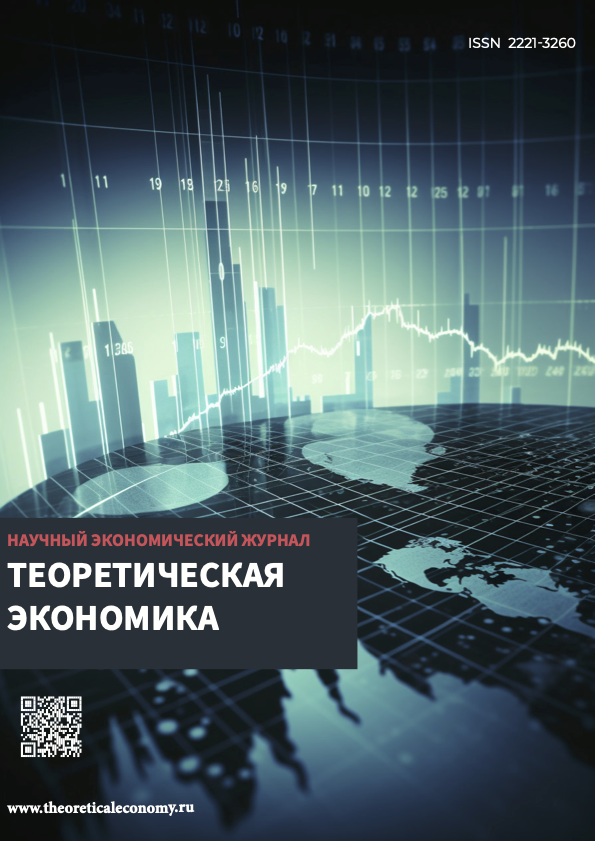Ivanovo, Ivanovo, Russian Federation
The formation of a new socio-economic system requires the formation of new conceptual foundations of theoretical and economic analysis. The development of the methodology of economic research is determined by: 1) the development of scientific knowledge itself, 2) the transitional nature of the object under study, 3) the specifics of the object of research itself. In this article, attention is mainly paid to such an aspect of the complex and large-scale process of forming a new paradigm of socio-economic research as the formation of a methodology that adequately reflects the specifics of scientific and technical work. The expediency and usefulness of considering this aspect is due to the fact that, in our opinion, scientific and technical work, combining the work of scientists, engineers, scientific and pedagogical workers, managers, becomes the dominant type of work, a system-forming factor of the emerging socio-economic system. The article provides a comparative characteristic of modern scientific and technical labor and the dominant form of labor in industrial society. The features of the organization, motivation, regulation of scientific and technical work, the specifics of its results are shown. It is concluded that the analysis of such a complex multi-faceted object as scientific and technical work can be fruitful only from the standpoint of an interdisciplinary approach based on the use of the "sociological man" model, and not the "economic man" model. The results of sociological research, research in the field of psychology and management allow us to characterize the role of social, socio-psychological, socio-cultural factors in innovation processes, to show the conditions for the formation of a favorable innovation climate, an effective model of innovative behavior. On the basis of an interdisciplinary approach, groups of factors that hinder and contribute to the implementation of innovative activities as a form of scientific and technical work are identified. This approach, therefore, can play an important role in the development of a set of measures to improve innovation policy at different levels.
scientific and technical work, scientific, educational and production process, interdisciplinary approach, economic and sociological method, model of a sociological person, innovative activity.
1. Bodrunov S.D. Gryaduschee. Novoe industrial'noe obschestvo: perezagruzka. / Monografiya/ - SPb: INIR. 2016. – 312 s.
2. Bodrunov S.D. Noonomika: traektoriya global'noy transformacii / Monografiya / - M.: INIR, Kul'turnaya revolyuciya, 2020. – 224 s.
3. Inozemcev V.L. K teorii postekonomicheskoy obschestvennoy formacii. M.: Taurus, 1995.- 330 s.
4. Kalashnikov M. Zametki o sleduyuschey rase / Postchelovechestvo / Nauchnyy redaktor M.B. Hodorkovskiy. – M.: Algoritm, 2006. – 320 s.
5. Fukuyama F. Nashe postchelovecheskoe buduschee: Posledstviya biotehnologicheskoy revolyucii. M.: Izd-vo «Lyuks». 2004. – 349 s.
6. Shvab K. Chetvertaya promyshlennaya revolyuciya. –M.: «Eksmo», 2016 – 138 s.
7. Novikov V.A. Nauchno-tehnicheskiy trud: soderzhanie, social'no-ekonomicheskaya forma, rol' i zakonomernosti razvitiya. – Ivanovo: Ivan. gos. un-t, 2004. – 196 s.
8. Novikov V.A. Rol' koncepcii nauchno-tehnicheskogo truda v issledovanii aktual'nyh problem rossiyskoy ekonomiki // Vestnik Ivanovskogo gosudarstvennogo universiteta. Ser.: Ekonomika. 2017. Vyp.3 (33). S.6-12.
9. Avtonomov V.S. Model' cheloveka v ekonomicheskoy nauke. SPb.: Ekonomicheskaya shkola, 1998. 230 s.
10. Aksenova O.V. Prakticheskaya sociologiya: trudnosti konceptualizacii i spontannaya mezhdisciplinarnost' // Sociologicheskie issledovaniya. 2020. №10. S.13-22.
11. Vol'chik V.V. Mezhdisciplinarnost' v ekonomicheskoy nauke: mezhdu imperializmom i plyuralizmom //TERRA ECONOMICUS. 2015. TOM 13, №4. S.52-64.
12. Kirdina S.G. Mezhdisciplinarnye issledovaniya v ekonomike i sociologii: problemy metodologii // Obschestvennye nauki i sovremennost'. 2014. №5. S.60-75.
13. Chelovek v ekonomike i drugih social'nyh sredah / Ros. akad. nauk, In-t filosofii; Otv. red. V.G. Fedotova. – M.: IFRAN, 2008. – 195 s.
14. Eynshteyn A. Motivy nauchnogo issledovaniya // Sobr. nauch. trudov v 4 t. M.: Nauka, 1967. 599 s.
15. Voychinskiy A.M., Lebedev O.T., Yudelevich M.A. Organizacionno-tehnologicheskiy bazis i nauchno-tehnicheskiy progress. M.: Vysshaya shkola, 1991. 192 s.
16. Zyablyuk R.T. Razvitie cheloveka v processe smeny ekonomicheskih sistem // Voprosy politicheskoy ekonomii. Vyp.1. 2020. S.36-58.
17. Katargin N.V. Cifrovaya transformaciya i voyna robotov s lyud'mi // Teoreticheskaya ekonomika. 2022. №8. S.14-22. [Elektronnyy resurs] – Rezhim dostupa k zhurn. Svobodnyy: htpp://www.theoreticaleconomy.ru.
18. Koval'chuk M.A. Problema osobennostey lichnosti novogo tipa v cifrovom obschestve // Teoreticheskaya ekonomika. 2022. №11. S.56-67. [Elektronnyy resurs] – Rezhim dostupa k zhurn. Svobodnyy: htpp://www.theoreticaleconomy.ru.
19. Varshavskaya E.Ya. Izbytochnaya kvalifikaciya rossiyskih rabotnikov: masshtaby, determinanty, posledstviya // Sociologicheskie issledovaniya. 2021. №11. S.37-48.
20. Indikatory innovacionnoy deyatel'nosti: 2022: statisticheskiy sbornik / V.V. Vlasova, L.M. Gohberg, G.A. Gracheva i dr.; Nac. issled. un-t «Vysshaya shkola ekonomiki». - M.: NIU VShE, 2022. - 292 s.
 This work is licensed under Creative Commons Attribution-NonCommercial-NoDerivatives 4.0 International
This work is licensed under Creative Commons Attribution-NonCommercial-NoDerivatives 4.0 International
















